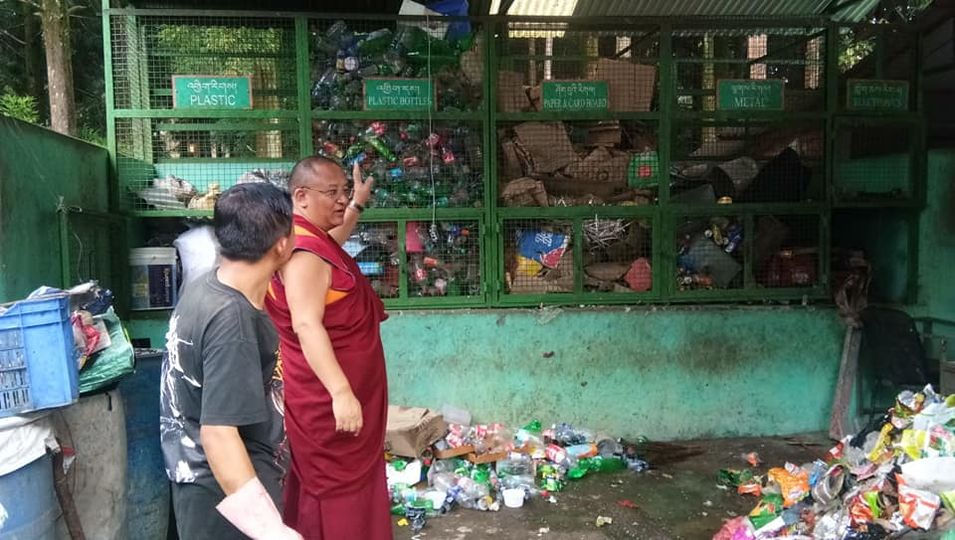Loka Initiative, Center for Healthy Minds
The Loka Initiative is an education and outreach programme at the University of Wisconsin-Madison for faith leaders and religious institutions. The initiative, which is based at the university’s Center for Healthy Minds, supports faith-led environmental efforts on both local and global scale through collaborating with religious institutions and faith leaders across the world on environmental protection, sustainable development and global health issues.
Dekila Chungyalpa (pictured below) is the director of the Loka Initiative. Speaking to FaithInvest chief executive Martin Palmer, Dekila explains how an understanding of ancient Buddhist wisdom enabled her to tackle her own personal crisis, which eventually led to the establishment of the Center for Healthy Minds.
'His Holiness the 17th Karmapa [spiritual leader of the 900-year-old Karma Kagyu lineage of Tibetan Buddhism] has been an environmentalist from a very young age, and I happened to meet him in 2008 where he asked me to create environmental guidelines for the Tibetan Buddhist monasteries and nunneries.
Thirst for knowledge and climate solutions
'I just thought ‘This is great! I am going to do something, move away from my actual work, take a vacation and create environmental guidelines that help make sense of what’s happening in terms of the environment and climate to Tibetan Buddhist monks and nuns. [What would have been a two-week investment has now] been 12 years!

‘There have been three instances now in 12 years where the scientific wisdom has had to differ [from traditional wisdom], but everything else has worked' – Dekila Chungyalpa
'But in the process of working with the senior monks and nuns that he had allocated to this project, what I discovered was their thirst for solutions and their thirst to understand what was happening around them.
'All of it came down to the fact that they really wanted science training. And so, we started doing very ad hoc science training that was grounded in Buddhist philosophy, and the importance of compassion, in the importance of interdependence, interconnectedness, all of which are basically the foundations of Buddhism, and we were able to talk about ecology in ways that represented these foundations.
'The monks and nuns, now trained, wanted to become an organisation. They call themselves Khoryug, which means ‘environment’ in Tibetan, and they have been really active since.
Every issue is directed by faith principles
'I have to say there have been three instances now in 12 years where the scientific wisdom has had to differ [from traditional wisdom], but everything else has worked. And ultimately, all the work that Khoryug does is led by their faith principles. One of the issues is forest fires. This idea that we would do forest management through fires is very painful for [Buddhist monks and nuns] because what they end up saying is ‘all the countless insects that die, all of those animals that die, is there not another way to do forest management?'
The Khoryug programme, headed by the 17th Karmapa, has tangible results. By the time of the 20018 Khoryug conference, 20 of the monasteries attending has solar projects, while 12 monasteries had rainwater harvesting programs and 10 monasteries had established organic farms.
At the eighth Khoryug conference, held in April 2021, a new guide was issued on disaster management, prompted by disastrous earthquakes in Nepal and Sikkim. It focuses on the five main physical threats in Tibet and across the Himayas – floods, storms, fires, landslides and earthquakes.

Success story: segregating and recycling waste at Bokar Monastery in Mirik, West Bengal, where the costs of the programme are expected to be recouped within four years Picture: Khoryug
Among the programme's latest achievements to be relayed ot the 2021 conference was news that Bokar Monastery in Mirik, West Bengal has set a goal of generating zero waste. The monastery has progress in just one year from burning all of its rubbish to partnering with a local zero waste NGO and building a waste segregation centre which generates income from recycled goods. Within eight months the monastery has already recouped 23% of its investment, and anticipates a full return in the next three years.
• Khoryug website

Comments